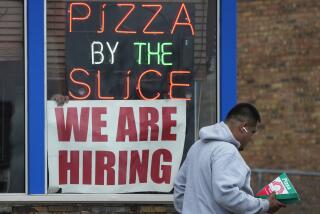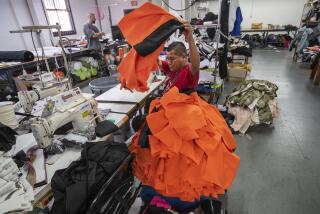Orders Decline for First Time in 7 Months
- Share via
WASHINGTON — Orders to U.S. factories declined in March for the first time in seven months, a report showed Tuesday, offering reassurances that economic growth soon will moderate to a pace unlikely to aggravate inflation.
The 1.6% drop to a seasonally adjusted $319.2 billion ended an otherwise strong first quarter. Orders, a reliable barometer of future production levels, rose 0.4% in February after jumping 2.5% in January.
Economists said the Commerce Department report fit with their expectation for slower, but still healthy, growth in the overall economy in the April-June quarter after torrid growth at 5.6% in the first quarter.
“It’s not necessarily bad that it’s slowing down. You can’t have too many quarters like the first quarter before you’re in serious trouble,” said economist Joel Prakken of Macroeconomic Advisers in St. Louis.
The more moderate pace of new orders should help prevent inflationary bottlenecks that develop when factories have more orders than they can handle.
In a sign the pressure is easing, the backlog of unfilled orders fell 0.4%, the first decline since August, even though shipments of manufactured goods, a measure of current production, edged down 0.1%.
In an attempt to forestall an acceleration of inflation, the Federal Reserve Board nudged interest rates a quarter-point higher March 25.
As recently as two weeks ago, nearly all economists expected Fed policy-makers to decide on another quarter-point tightening when they next meet on May 20. Now they’re not so sure.
“I think it’s close to 50-50 at this point,” said economist Evelina M. Tainer of Indosuez Carr Futures Inc.
Consumer demand seems to be slowing even absent additional interest-rate increases. But unemployment dipped in April below 5% for the first time in almost 24 years. That could produce wage inflation, spilling over into higher costs for goods as companies raise prices to meet higher payrolls.
And stock prices, after a nearly 10% tumble between March 11 and April 11, are again in the range that Fed Chairman Alan Greenspan might consider irrationally exuberant.
The Dow Jones average of industrial stocks rose 10.83 points Tuesday to close at a record 7,225.32, after wiping out the last vestiges of the March-April slide on Monday. Bond prices were little changed.
“I think Greenspan is going to worry about that,” Tainer said.
March’s reduction in factory orders was broad-based and included a 2.6% drop in orders for durable goods, expensive items intended to last three or more years, and 0.3% for nondurable goods.
Within durable goods, transportation equipment--often a volatile sector--fell 4.6%. That included a 20.9% drop in aircraft orders and a decline in the auto industry, where some plants were idled by strikes.
Declines in electrical equipment and industrial machinery offset gains in stone and glass products and primary metals.
(BEGIN TEXT OF INFOBOX / INFOGRAPHIC)
Factory Orders
New orders, in billions of dollars, seasonally adjusted:
March: $319.2
Source: Commerce Department
More to Read
Inside the business of entertainment
The Wide Shot brings you news, analysis and insights on everything from streaming wars to production — and what it all means for the future.
You may occasionally receive promotional content from the Los Angeles Times.










